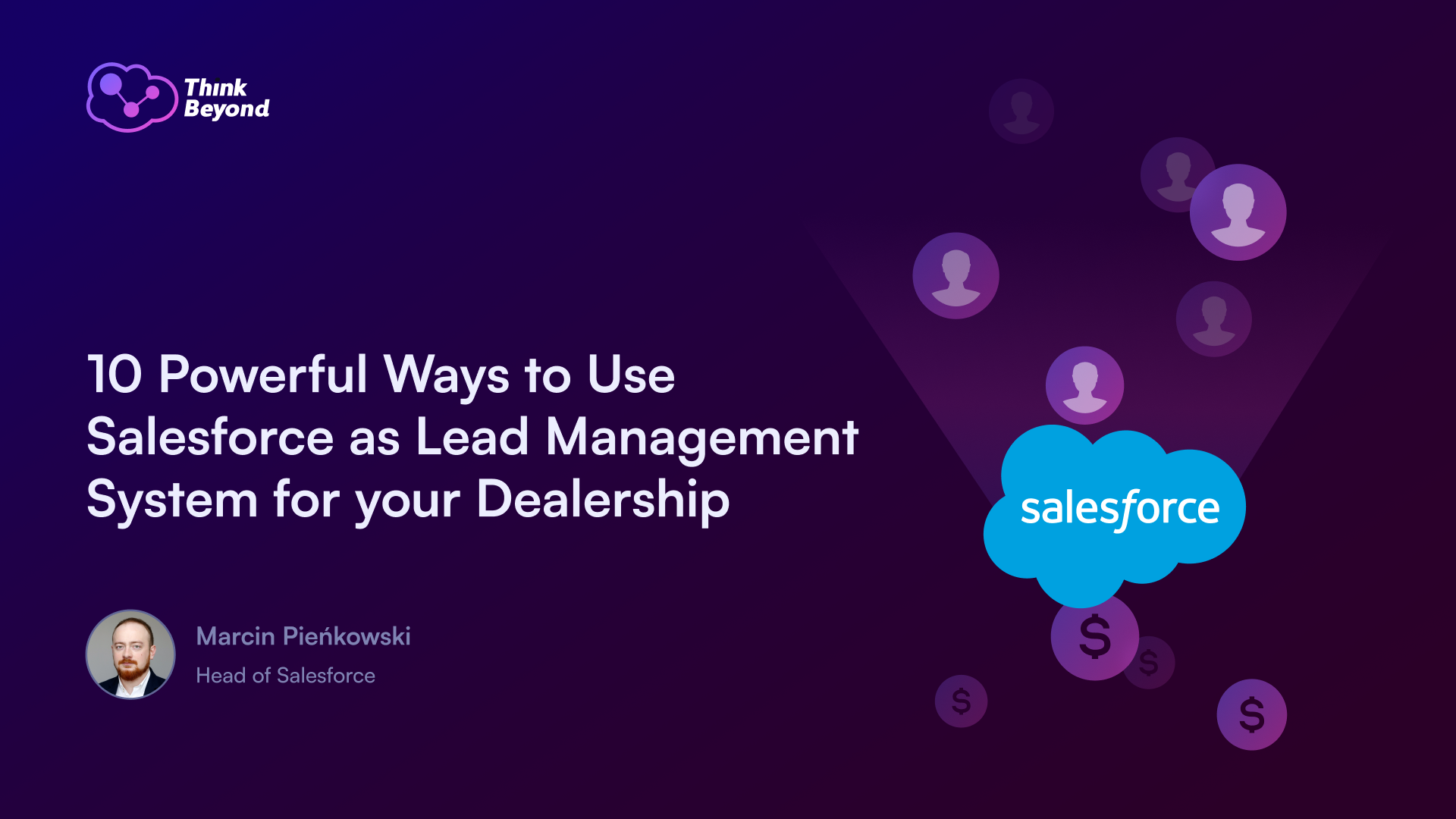
Automotive industry belongs to the one which is heavily dependent on technology. This should mean that there is no problem with collecting and processing data. But the reality looks different:
only 46% of companies report having comprehensive data
according to the report Trends in Automotive.
There is still room for improving the dealer operations. The best solution is to deploy a Lead Management System that is specially developed to cater for the needs of the automotive industry. It’s possible with Salesforce development services. What are the ways to use Salesforce platform? Let’s go deeper into it.
#1 Nurture Leads
Dealerships can effectively manage leads by importing them from outside sources and automatically capturing them from web-to-lead forms, social media, and other platforms. Regular database cleaning ensures data accuracy and relevance. A lead scoring system allows for prioritization based on potential, while a tracking of lead sources provides insights into campaign effectiveness.
Salesforce campaign management tools allow for targeted outreach, maximizing engagement and conversion. Additionally, detailed lead history tracking provides valuable context for personalized interactions, enhancing the overall customer experience. With Salesforce, dealerships can streamline their lead management processes and optimize conversions.
#2 Delight Customers
What does it mean to delight customers in the automotive industry? It is mainly achieved by offering personalized experiences, excellent customer service, and proactive communication.
Every step offers the chance to delight the customer. The Salesforce solutions meticulously map and optimize every interaction in the car buying journey to foster engagement and satisfaction.
This goes beyond just answering the phone or replying to an email. Powered by intelligent chatbots, customer service ensures round-the-clock assistance and prompt solutions to queries. Salesforce integrates CRI solutions to unify communication channels and provide a cohesive experience.
#3 Optimize The Sales Pipeline
To boost sales, rely on a centralized customer relationship management platform like Salesforce to streamline procedures. Sales teams can respond promptly to customer inquiries by using Salesforce tools for delivering accurate quote configurations.
Preparing production orders within the CRM ensures efficient coordination between sales, production, and fulfillment, enhancing efficiency and enhancing customer satisfaction.
#4 Improve Car Buying Experience
Storytelling in the car buying journey? Yes, but the timing really matters. Many purchases involve extensive consideration, some buyers act impulsively due to immediate needs. Knowing what is the stage and pace of the customer journey ensures timely and relevant interactions that resonate with their current mindset and requirements. That’s personalization in action!
Improve the car buying experience by focusing on test drives. Utilize Salesforce test drive booking system to streamline the booking process and provide personalized recommendations based on preferences. A well-executed test drive influences purchasing decisions.
#5 Take Care Of Your Online Presence
Boosting online visibility requires embracing a multichannel strategy for seamless client interaction. How to do this?
Make sure everything stays the same from the web to the social channels, so your customers get the same brand vibe. Highlight customer testimonials to build trust and credibility, showcasing positive experiences. Take charge of your online reputation and respond to feedback promptly.
#6 Sell Vehicles, Parts, And Services
With Salesforce capabilities, selling vehicles, parts, and services becomes uncomplicated. You can efficiently manage vehicle stock with integrated inventory solutions. The customer is quickly informed what cars are available and what will be the delivery time.
Track leads, handle customer interactions, and close deals efficiently with Salesforce’s opportunity management and CRM tools. Sales Cloud simplifies the sales process and Marketing Cloud empowers targeted campaigns, boosting interaction and triggering sales.
#7 Prepare Attractive Offers
Integrating Salesforce with insurance agents streamlines the process, allowing you to get multiple insurance quotes at once. By connecting Salesforce with financial institutions and banks, dealerships can offer different ways to finance both personal and business purchases.
The cloud-based platform enables effective handling of financing requests. Retailers can craft appealing deals that cater to individual client wants and preferences.
#8 Follow-Up Properly
Test drives, sales transactions, and service encounters can be incorporated into the surveys via Salesforce. When you look at Net Promoter Score (NPS), you can see what’s good and what needs improvement.
Survey data on customer satisfaction (CSAT) empowers retailers to fine-tune offerings and tailor solutions to meet client demands. Post-sales feedback helps to check if things were delivered correctly, and make sure customers are happy.
#9 Build A Paperless Process
Salesforce simplifies document creation, storage, and distribution. It reduces paper clutter and boosts effectiveness by reducing administrative tasks. Customers and staff can access, review, and sign the documents electronically from initial inquiries to final delivery.
By implementing digitization across the entire process, Salesforce helps dealerships to mitigate errors and provide exceptional customer service.
#10 Make Data-Driven Decisions With Actionable Insights
Businesses can make data-driven decisions with Salesforce tools, which provide a comprehensive 360-degree view of customers, ROI, revenues, and emerging business trends. Real-time insights can be used to inform strategic initiatives and optimize resource allocation.
This holistic perspective makes organizations agile and responsive to market dynamics.

The Lead Management System Improves Your Dealership
Implementing a Lead Management System (LMS) offers numerous advantages for businesses. Several of them are listed below:
- Improved Customer Lifetime Value. The targeted lead nurturing ensures that the customer remains engaged and interested in the brand over time.
- Reduced customer churn. Tracking leads and attending to their requirements regularly boosts retention rates.
- Increased customer engagement. The creation of personalized interactions and content that is tailored to lead behavior and preferences results in stronger connections and brand loyalty..
- Improved brand equity. The organization is regarded as a trustworthy and responsive partner in the industry.
- Optimized service and marketing. The automation of lead management processes streamlines communication. This efficiency translates to lower operational expenses and increased ROI.
- Better retention rates. Customers become brand advocates.
The implementation of a lead management system (LMS) has the potential to transform the way dealerships manage pre-sales, sales, and services. Effective lead acquisition and nurturing enhances pre-sales efforts. During the sales process, LMS provides effective lead tracking and follow-up. The post-sale service guarantees prompt and personalized assistance to enhance customer satisfaction and loyalty.
Overall, LMS empowers dealerships to deliver a cohesive and superior customer experience at every stage of the buying journey, driving success and growth in the automotive industry.
